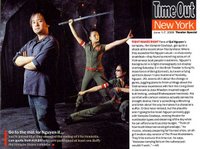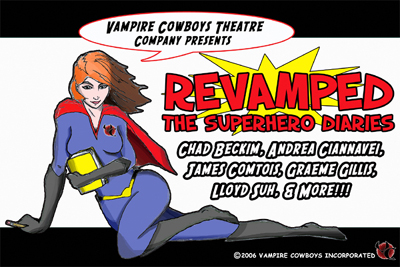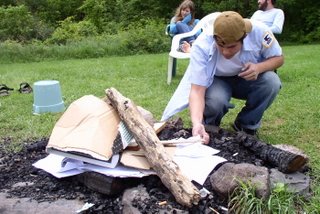 T
Three words come to mind when I think of Mike Lew: preternatural, pyromaniac and pedophile. None of these words, however, are really appropriate. So perhaps it's best if I let Mike speak for himself.
1. Both of your parents are scientists, and you were a Westinghouse Finalist for your work on mouse homeobox genes. Does your background in the sciences affect your writing for the theater? Or do the two disciplines of science and art remain separate and distinct in your life?
I grew up with two parents who are doctors, and I'd spent three years working in a bio lab in high school. I made the jump from bio to theater when I was in college. At the time, I was acutely aware of theater being perceived as frivolous by my family and colleagues in the sciences. I had an impulse to fight against that by trying to maintain some of the discipline and rigor that went into my lab work. Now that I know how hard it is to make a living in the theater, I’m not so hung up on proving to myself that theater is a real discipline. However, I do think that I’ve retained some aspects of my scientific background.
Sometimes I think of my directing in terms of a loosely scientific method, trying to isolate and toggle variables in the hopes of seeing what kinds of new outcomes will develop. Rather than being goal-oriented during rehearsals and run-throughs, I tend to think of those sessions as contributing new data to an ongoing experiment.
I also find that scientific metaphors will creep into my work, or that science serves as the substratum upon which I've built my plays. For example, my latest play “A Better Babylon” starts with a free-response biology lecture on the evolution of shell patterns in gastropods.
2. In addition to being a playwright you are also a director. How does being a playwright inform your directing and vice versa? How do you feel about playwrights directing their own plays?I fully support playwrights directing their own plays, but only insofar as they can separate their writing impulses from their directing impulses. I know that my writer side is more indulgent and poetic while my director side is more limiting and pragmatic. As long as the playwright is able to separate what works best dramatically onstage from what sounds perfectly writerly in their head, then who better to realize the playwright’s vision than the actual playwright?
Personally, I’m trying to move away from directing my own work. I used to do it out of necessity but now I like seeing other directors move my plays in directions that I'd never imagined before, directions that are surprising and yet absolutely married to the heart of the play. In the same way that actors can deliver my lines with a style that’s in sync with my vision yet skew to how I'd originally imagined it, I like seeing directors apply the same kind of skew-yet-true interpretations to my plays.
I think I'm a great director for other writers because I tend to hold the writer's vision in such high regard. Since I’m also a writer, I understand the mechanics of other writers’ plays - how the lines work above and below the surface of the drama, what the lines are accomplishing in terms of both storytelling and character. That kind of awareness makes for good collaborations with other playwrights.
3. What already existing play do you wish you'd written and why?“Steve” by Steve Belber. Steve Belber is my favorite writer and one of my favorite people. “Steve” is a one-act of his about three guys, each named Steve, who kill each other in an ongoing continuous cycle. It’s deep and it’s terribly funny. It’s existential, but while most existential plays have these characters who sit there sighing away about how existential their life has turned out to be, this is existentialism with real teeth. I like plays that make me laugh and laugh until I forget… and then afterwards stick with me and bother me all night for months. “Steve” does that to me. I wish my work had that effect on people too.
4. What do you feel is the role of the artist in today's society?I think there’s a gamut of roles an artist can adopt in today’s society, and our artistic priorities dictate which of those roles we choose to adopt. For example, some writers have work that is far more overtly political than mine. I absolutely think the role of the artist in today’s society can be political, but I don’t often choose to assume that role.
On the other hand, as a Chinese-American I am particularly sensitive to the paucity of minority casting that goes on in today’s theater, and I think that part of my job as a director is to get more minority actors onstage playing meaty, nuanced, “mainstream” roles. Not every director feels as strongly about accepting that particular role, but it’s one of the ones I’ve chosen for myself.
In terms of my writing, I am most interested in experimenting and in inviting audiences and collaborators in on my experimentation. I like playing with language; I like being able to laugh uproariously while trying to figure out what exactly makes people laugh; I like delving into history and trying to predict the future with the past.
My role is to use my own observations about the world to create a larger discussion about the world. My role is to gainfully employ talented collaborators so that they too can enter that discussion. Some use their work to entertain, some to exact change, some to expose injustice, some to portray the human condition. I just want to use my writing to ask big questions and to get into a meaningful dialogue.
5. If you could get rip-roaring drunk with any playwright (living or dead) who would it be and why?I used to really idolize Beckett’s writing, but I wonder whether he’d be an animated drunk or just sort of sit there sullenly sipping whiskey. So since I’m not sure whether drinking with him would be fun or not, I think I’d choose any one of the Youngblood playwrights. Getting drunk with an idol playwright sounds nice, but I always end up having the most fun with people who are comforting and familiar. I also tend to think about life in terms of how I’ll think about present experiences later on.
Whenever I drink with Youngblood playwrights I delight in thinking of how I’ll think back on this experience and be able to say “I knew them when.” There are such talented, compelling, full-of-soul writers in this group. There’s going to be a lot of “I knew them when.”
Also I don’t think Beckett would get me water if I drank too much whiskey and threw up on my shoes. What a fucker.
~ Mike Lew as interviewed by Kevin Christopher Snipes, November 19, 2006
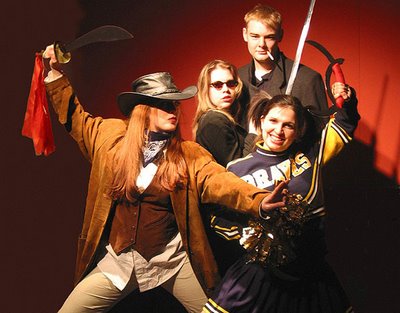
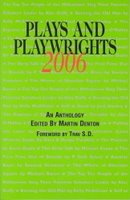
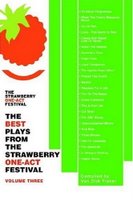 t as two secret lovers attempt to reconcile their romantic dreams.
t as two secret lovers attempt to reconcile their romantic dreams.
